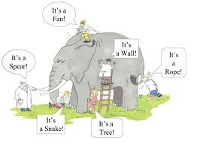Last week I published Part 01 of a series of articles on parenting and how the principles of Neuro Linguistic Programming can help you create more joy and fulfillment in your parenting experience. This week we continue from the last weeks exercise that you would have completed by now and identified the areas in which you will be taking ownership & responsibility for your child's feelings & behaviors.
 The next step you must take is to start developing a new understanding about your child's behaviors.
The next step you must take is to start developing a new understanding about your child's behaviors.
A mother once remarked to me that her 3 year old daughter is very stubborn. When I asked her what makes her say that, she replied "she just refuses to brush her teeth at night and I am at my wits end trying to figure out how to get her to do it". On further discussion I found out that the story was not much different in the mornings except that the will of the mother prevailed in the mornings.
what makes her say that, she replied "she just refuses to brush her teeth at night and I am at my wits end trying to figure out how to get her to do it". On further discussion I found out that the story was not much different in the mornings except that the will of the mother prevailed in the mornings.
One of the principles that I have found of great use to me as a parent and as an NLP trainer is a belief that a child will never resist any experience unless she finds it unpleasant at a sensory level (sight, sound, touch, taste or smell). So I asked this mother if she had checked whether the tooth brush was hurting the child in any way or the toothpaste had any unpleasantness to its taste for the child.
a belief that a child will never resist any experience unless she finds it unpleasant at a sensory level (sight, sound, touch, taste or smell). So I asked this mother if she had checked whether the tooth brush was hurting the child in any way or the toothpaste had any unpleasantness to its taste for the child.
Sure enough, it turned out that they replaced the toothbrush with a softer toothbrush and since then the young girl has become (in the mothers words) "wonderfully obedient".
As adults, we perceive the world differently than the way children perceive the world. One of the things that makes a huge difference in your ability to shape up the child is to re-learn how to perceive the world same as the way the child perceives the world and since the child is growing, her perceptions are constantly evolving. This requires you to constantly evolve your perception along with your child's. It is a constant learning process for the parent more than the child.
the world. One of the things that makes a huge difference in your ability to shape up the child is to re-learn how to perceive the world same as the way the child perceives the world and since the child is growing, her perceptions are constantly evolving. This requires you to constantly evolve your perception along with your child's. It is a constant learning process for the parent more than the child.
Exercise
From the areas identified in your last week's exercise, make a list of adjectives that you or another adult identifies with your child's behaviors. What are the perceptions you have formed about those behaviors, and the cause and outcome of those behaviors? Write these down in your "The Gift Of Parenting" diary.
Now ask yourself what other meanings could be possible.
Specifically ask yourself what, at a sensory level of sight, sound, touch, taste and smell, could be unpleasant for your child.
 Make a list of how you will alter the sensory experience of sight, sound, touch, taste and smell to make it more pleasant.
Make a list of how you will alter the sensory experience of sight, sound, touch, taste and smell to make it more pleasant.
Start putting this into your daily practice and watch the magic of parenting unfold. Gift yourself this magic.
continued.... (Click Here for Part 03)




